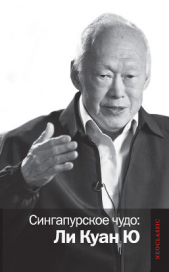Сингапурское чудо: Ли Куан Ю

Сингапурское чудо: Ли Куан Ю читать книгу онлайн
Ли Куан Ю – первый премьер-министр Сингапура, творец «сингапурского экономического чуда». Под его руководством Сингапур из бедной страны «третьего мира» превратился в одно из самых богатых и развитых государств.
Кто творит историю? Массы или отдельные личности?
Когда речь заходит о Ли Куан Ю, первом премьер-министре Сингапура, подобный вопрос даже не возникает. Потому что именно этому человеку удалось почти невозможное – победить коррупцию, межэтнические и межрелигиозные трения, поднять экономику, лежавшую в руинах, на высочайший уровень с помощью удачно проведенной модернизации.
Так кто же он – политик, которым восхищались Ричард Никсон и Генри Киссинджер, с которым мечтали встретиться такие разные люди, как Барак Обама и Си Цзиньпин? Как удалось ему создать не имеющее аналогов «сингапурское чудо»? И возможно ли повторить его гениальный опыт в другой стране?..
Внимание! Книга может содержать контент только для совершеннолетних. Для несовершеннолетних чтение данного контента СТРОГО ЗАПРЕЩЕНО! Если в книге присутствует наличие пропаганды ЛГБТ и другого, запрещенного контента - просьба написать на почту [email protected] для удаления материала
20. В том или ином обществе на 1000 рожденных детей такой-то процент почти гениев, такой-то процент обычных детей, столько-то идиотов… И именно число близких к гениальным и тех, кто выше среднего уровня, в конечном счете определяет параметры будущих ситуаций… Мы хотим общества равных. Мы хотим всем дать равные возможности. Но подсознательно мы никогда не обманываемся по поводу того, что люди вообще равны по их жизненной энергии, по их энергетике, по уровню их самоотверженности, по их врожденным способностям.
21. Я бы не хотел, чтобы обо мне помнили как о государственном деятеле. Прежде всего, я не отношу себя к категории государственных деятелей. Я считаю себя решительным, последовательным, настойчивым. Я деятельная натура. Я стараюсь каждое дело доводить до его логического конца. Вот и все… Любой, кто считает, что он государственный деятель, должен обратиться к психиатру.
О центре «Белфер» по вопросам науки и международных дел
Библиография
Belfer Center for Science and International Affairs John F. Kennedy School of Government, Harvard University Acharya, Amitav, and Evelyn Goh, eds., Reassessing Security Cooperation in the Asia-Pacific: Competition, Congruence, and Transformation (2007)
Agha, Hussein, Shai Feldman, Ahmad Khalidi, and Zeev Schiff, Track-II Diplomacy: Lessons from the Middle East (2003)
Allison, Graham, and Robert D. Blackwill, with Ali Wyne, Lee Kuan Yew: The Grand Master’s Insights on China, the United States, and the World (2012)
Allison, Graham T., Owen R. Cote Jr., Richard A. Falkenrath, and Steven E. Miller, Avoiding Nuclear Anarchy: Containing the Threat of Loose Russian Nuclear Weapons and Fissile Material (1996)
Allison, Graham T., and Kalypso Nicolaidis, eds., The Greek Paradox: Promise vs. Performance (1997)
Arbatov, Alexei, Abram Chayes, Antonia Handler Chayes, and Lara Olson, eds., Managing Confict in the Former Soviet Union: Russian and American Perspectives (1997)
Bennett, Andrew, Condemned to Repetition? The Rise, Fall, and Reprise of Soviet-Russian Military Interventionism, 1973–1996 (1999)
Blackwill, Robert D., and Paul Dibb, eds., America’s Asian Alliances (2000)
Blackwill, Robert D., and Michael Sturmer, eds., Allies Divided: Transatlantic Policies for the Greater Middle East (1997)
Blum, Gabriella, and Philip B. Heymann, Laws, Outlaws, and Terrorists: Lessons from the War on Terrorism (2010)
Brom, Shlomo, and Yiftah Shapir, eds., The Middle East Military Balance, 1999–2000 (1999)
Brom, Shlomo, and Yiftah Shapir, eds., The Middle East Military Balance, 2001–2002 (2002)
Brown, Michael E., ed., The International Dimensions of Internal Conflict (1996)
Brown, Michael E., and Sumit Ganguly, eds., Fighting Words: Language Policy and Ethnic Relations in Asia (2003)
Brown, Michael E., and Sumit Ganguly, eds., Government Policies and Ethnic Relations in Asia and the Paci.c (1997)
Carter, Ashton B., and John P. White, eds., Keeping the Edge: Managing.
Defense for the Future (2001)
Chenoweth, Erica, and Adria Lawrence, eds., Rethinking Violence: States and Non-State Actors in Con.ict (2010)
de Nevers, Renee, Comrades No More: The Seeds of Change in Eastern Europe (2003)
Elman, Colin, and Miriam Fendius Elman, eds., Bridges and Boundaries:
Historians, Political Scientists, and the Study of International Relations (2001)
Elman, Colin, and Miriam Fendius Elman, eds., Progress in International Relations Theory: Appraising the Field (2003)
Elman, Miriam Fendius, ed., Paths to Peace: Is Democracy the Answer? (1997)
Falkenrath, Richard A., Shaping Europe’s Military Order: The Origins and Consequences of the CFE Treaty (1995) Falkenrath, Richard A., Robert D. Newman, and Bradley A. Thayer, America’s Achilles’ Heel: Nuclear, Biological, and Chemical Terrorism and Covert Attack (1998)
Feaver, Peter D., and Richard H. Kohn, eds., Soldiers and Civilians: The Civil-Military Gap and American National Security (2001)
Feldman, Shai, Nuclear Weapons and Arms Control in the Middle East (1996)
Feldman, Shai, and Yiftah Shapir, eds., The Middle East Military Balance, 2000–2001 (2001)
Forsberg, Randall, ed., The Arms Production Dilemma: Contraction and Restraint in the World Combat Aircraft Industry (1994)
George, Alexander L., and Andrew Bennett, Case Studies and Theory Development in the Social Sciences (2005)
Gilroy, Curtis, and Cindy Williams, eds., Service to Country: Personnel Policy and the Transformation of Western Militaries (2007)
Hagerty, Devin. T., The Consequences of Nuclear Proliferation: Lessons from South Asia (1998)
Heymann, Philip B., Terrorism and America: A Commonsense Strategy for a Democratic Society (1998)
Heymann, Philip B., Terrorism, Freedom, and Security: Winning without War (2003)
Heymann, Philip B., and Juliette N. Kayyem, Protecting Liberty in an Age of Terror (2005)
Howitt, Arnold M., and Robyn L. Pangi, eds., Countering Terrorism: Dimensions of Preparedness (2003)
Hudson, Valerie M., and Andrea M. Den Boer, Bare Branches: The Security Implications of Asia’s Surplus Male Population (2004)
Kayyem, Juliette N., and Robyn L. Pangi, eds., First to Arrive: State and Local Responses to Terrorism (2003)
Kokoshin, Andrei A., Soviet Strategic Thought, 1917–91 (1998)
Lederberg, Joshua, ed., Biological Weapons: Limiting the Threat (1999)
Mans.eld, Edward D., and Jack Snyder, Electing to Fight: Why Emerging Democracies Go to War (2005)
Martin, Lenore G., and Dimitris Keridis, eds., The Future of Turkish Foreign Policy (2004)
May, Ernest R., and Philip D. Zelikow, eds., Dealing with Dictators: Dilemmas of U.S. Diplomacy and Intelligence Analysis, 1945–1990 (2007)
Phillips, David L., Liberating Kosovo: Coercive Diplomacy and U.S. Intervention (2012)
Shaffer, Brenda, Borders and Brethren: Iran and the Challenge of Azerbaijani Identity (2002)
Shaffer, Brenda, ed., The Limits of Culture: Islam and Foreign Policy (2006)
Shields, John M., and William C. Potter, eds., Dismantling the Cold War: U.S. and NIS Perspectives on the Nunn-Lugar Cooperative Threat Reduction Program (1997)
Tucker, Jonathan B., ed., Toxic Terror: Assessing Terrorist Use of Chemical and Biological Weapons (2000)
Utgoff, Victor A., ed., The Coming Crisis: Nuclear Proliferation, U.S. Interests, and World Order (2000)
Weiner, Sharon K., Our Own Worst Enemy? Institutional Interests and the Proliferation of Nuclear Weapons Expertise (2011)
Williams, Cindy, ed., Filling the Ranks: Transforming the U.S. Military Personnel System (2004)
Williams, Cindy, ed., Holding the Line: U.S. Defense Alternatives for the 21st Century (2001)


























